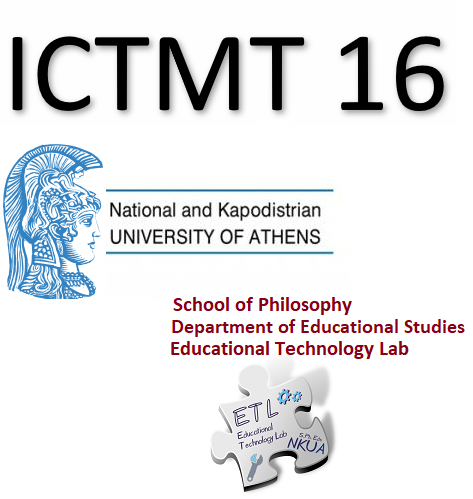|
Nathalie Sinclair, Simon Fraser University |
||
|
I discuss the historical, colonial roots of the dismissal of aesthetics in current mathematics education research, as well as examples of what an aestheticising of mathematics education might look like, drawing on my own research with multitouch digital technologies. |
||
|
|
||
|
Osama Swindan, Ben Gurion University of the Negev |
||
|
Since its initial development in the 1990s, the use of augmented reality technology has become widespread over a variety of fields and disciplines. The effectiveness of augmented reality technology has been shown in fields such as medicine, engineering, and industry; on the other hand, its effectiveness in mathematics education is still under discussion among researchers. In my talk, I will first review the development of the use of augmented reality technology in teaching and learning mathematics. Afterward, in order to demonstrate the potential of augmented reality in mathematics, I will present some of the latest developments in this field and new augmented reality prototypes.Finally, some augmented reality studies in which I have been involved will be discussed from diverse theoretical perspectives. This will show that augmented reality may not only have practical importance but theoretical importance as well. |
||
|
|
||
|
Nicholas Jackiw, Simon Fraser University.
|
||
|
All digital environments embed aspects of design. All designers of digital environments bring their own perspectives and "principles" to what they do. In mathematics education, this results in very different looking digital environments that can have very different goals and purposes. Our panelists will share their ideas on their design process, alongside providing some insights and reflections on their resulting digital tools, resources and associated tasks. |
||
|
|
||
|
Dimitra Egarchou, CTI Diophantus, Scalling up in-service professional development for teachers: a 20-year intervention towards the use of digital media in classroom (click to watch the video) |
||
|
|
||
| International projects (click to watch the video) 1. Birgit Pepin, Ulises Salinas Hernandez & Zeger-jan Kock "University mathematics students' interactions with digital resources" 2. Guido Pinkernell, Jose Manuel Diego Mantecón, Zsolt Lavicza, Chris Sangwin "The Project AuthOMath : Towards a didactic concept for designing digital interactive tasks with automatic answer based feedback" 3. Bärbel Barzel, Laura Graewert, Anica Eumann "BASE - Formative self-assessment of arithmetic competencies" "SMART - Specific Mathematics Assessments that Reveal Thinking" 4. Michael Rumbelow "Augmenting Block Play: using ai to recognise and respond to arrangements of physical block manipulatives" 5. Chronis Kynigos "STEAMTEACH - STEAM Education for Teaching Professionalism" "GAMMA-GAMe-based learning in Mathematics" "EXTENDT2 - Extending Design Thinking with Emerging Digital Technologies" "TRANSEET - Transforming Education with Emerging Technologies" 6. Osama Swidan, Michael N. Fried, Sara Bagossi, Otman Jaber, Omar Abu Asbe, & Inbal Israel "AR4MATH - Augmented reality for learning Math" 7. Anna Baccaglini-Frank, Samuele Antonini, Chiara Bonadiman, Pietro Di Martino, Giulia Lisarelli, Elena Macchioni, Mirko Maracci, Elisa Miragliotta, Bernardo Nannini, Cristina Poli, Elisabetta Robotti DynaMat: Dynamic Math for Inclusive Education 8. Rebecca S. Stäter, Bjarnheiður Kristinsdóttir "<colette/> = Computational Thinking Learning Environment for Teachers in Europe" 9. Tonia Esposito, Francesco Saverio Tortoriello "Building toys with a 3D printer in kindergarten" |
||
|
|
||
|
Celia Hoyles (University College London), The role of Artificial Intelligence and Learning Analytics in transformative mathematics education (click to watch the video) |
||
|
The hype of Artificial Intelligence (AI) and Learning Analytics (LA) is increasingly having an influence on how education could be carried out and improved. For example, around the world, there are several multi-million-dollar-funded corporations claiming to be using AI to ‘transform’ education. Despite these efforts, there is not always enough evidence to support these claims. From an academic perspective, most of the research in AI and mathematics education in the past witnessed the emergence of intelligent tutoring systems and intelligent assessment, at times simply digitising poor pedagogical practices. This panel will look into the promises and pitfalls of AI and LA investigating the relevance of this set of emerging technologies with a focus on the theme of the conference, namely – transforming mathematics education. The panelists will present and discuss their research and visions for opening new avenues of research and innovation but also adopting a balanced critical view of the current state-of-the-art. The audience will have the opportunity to contribute in defining priority areas and all together we will try to reach a vision of how AI and LA can be used for transforming mathematics learning and teaching. |
||
|
|
||
|
Closing Ceremony (click to watch the video) Chair: Hans-Georg Weigand (Wuerzburg University) |
||
Choose timezone
Your profile timezone:

